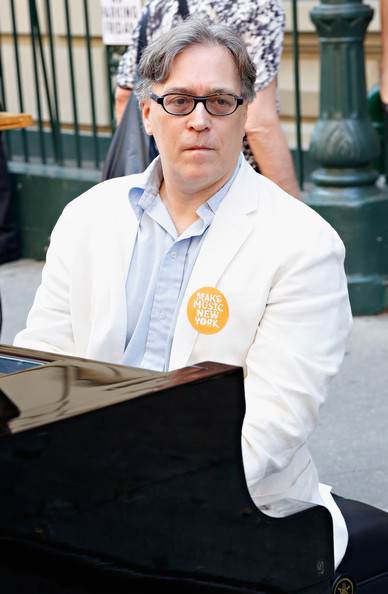Distler roves with charm from Rzewski to Distler and Maslanka at Bargemusic

Jed Distler is a musician’s musician. The pianist and composer is at home in the classical repertoire—all the way through post-WWII modernism and beyond—and just as much in jazz and theatre music. He is steeped in American repertory, playing Morton Feldman, Thelonious Monk, and Stephen Sondheim.
At Bargemusic Friday night, Distler played music from another pianist-composer, Frederic Rzewski, as well as his own music and a piece from a former composition teacher, David Maslanka, as part of the venues Here and Now contemporary music series.
Along with Distler’s musical skills, the audience got to enjoy his easy charm from the stage—he knows how to entertain. That was an integral part of what was a typical Distler recital, mixing musicality and intelligence. Distler’s can mix wit with seriousness in his music and his playing, without diluting either.
Distler and Rzewski were colleagues and collaborators, and the performance opened with Rzewski’s Piano Piece No. 4, one of his works that starts in forceful agitation, out of which a powerful, no-nonsense theme emerges. Distler kept the textures clear, even as the score descends to the lowest range of the instrument, and put the thematic material on clear display. It was surprising to hear such a light touch with Rzewski, and it worked.
Distler played some of his own new music, with an introduction for each from the stage. Uber Alles was a set of variations on the Austrian national anthem—written for an other, unnamed pianist, Distler said, and he wasn’t sure it had been played in public yet; this was at the least the New York premiere. Short, but packed with ideas and information, it was both charmingly clever and impressively smart.
Distler’s Rocket Rockit Rockette and Citta Desolata—which he played later in the set—were written for a collection of pieces inspired by Ray Bradbury stories. This was from the author’s Rocket Man, and Distler primed the audience to listen to a discrete quote from Elton John’s song as well, though there was no reference to Herbie Hancock’s “Rockit.”
The Bradbury music was in turns episodic in the narrative sense, and wonderfully atmospheric. The drama of the first piece was outlined, left for the listener to fill in, while Citta Desolata, meant to reflect the aftermath of an apocalyptic event, was unexpectedly lyrical, a lovely, song-like ballad.
Distler also premiered three of his Bagatelles, part of a series he’s planned of 1,827 of these short pieces, timed to the 200th anniversary of Beethoven’s death. He said he’s completed some 400 so far, and in concise manner the three ranged wide; the first slow and spacious, the second an exploration of polyrhythms, and the third slow again but capturing some of the impish energy of Beethoven. Distler’s relaxed, graceful playing was part of the enjoyment.
Maslanka was well known for his expertise in writing music for wind bands, and apparently his Piano Song was his only solo work for the instrument. Distler related that the composer was depicting his impressions of the New Hampshire landscape, but the music, in this sensitive performance, sounded even more spacious, like something out of the Great Plains. It was wonderfully pictorial and cinematic.
Distler closed the evening with a Rzewski premiere, and another of his own. The former piece was The Good Old Days, the story being that Distler asked for rags from other composers to honor the Sesquicentennial of Scott Joplin’s birth. Few delivered, though Rzewski did, even though the composer told Distler it wasn’t ready to be performed and needed more work. (Rzsewski revised it a few times but never completed it before his death last year).
Honestly, the piece didn’t sound ready for performance. It had a fragmented manner, fairly typical of Rzewski’s work, but never drew the pieces together into anything solid. And for a composer who had such an American sound, there was no discernible ragtime quality.
Last was Distler’s own Ameritango, his answer to a call for new works based on “America The Beautiful,” a song he was upfront about detesting. Out of that distaste, he made something stylish, fun, and with some touches of Astor Piazzolla. If only hatred could regularly produce such positivity.
As an entertainer, Distler was ready to play encores, and with his reputation, the audience expected them. He dashed off three, short and sweet, including Virgil Thomson’s Tango Lullaby and, at then end, Duke Ellington’s beautiful Single Petal of a Rose. Distler was equally at home in each.
The BTMG Chamber Orchestra plays a music competition contest winners concert, 4 p.m. and 6 p.m. November 19. bargemusic.org



Posted Nov 05, 2022 at 4:11 pm by Richard Westerdale
Is he related to the 20th century composer Hugo Distler?